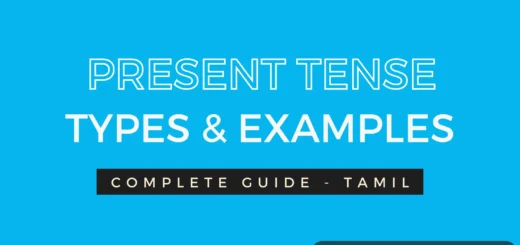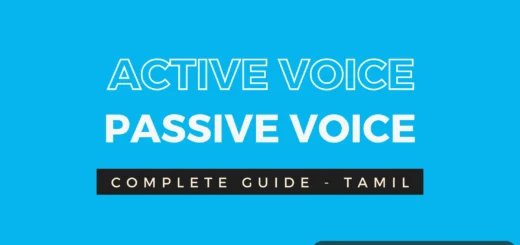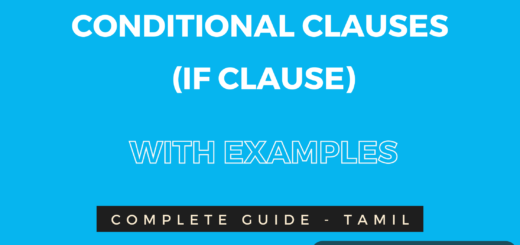Auxiliary verbs (துணை வினைச்சொற்கள்) Meaning in Tamil
Auxiliary verb
Auxiliary verb ஆனது தமிழில் துணை வினைச்சொல் என அழைக்கப்படுகிறது. அதன் பெயரில் உள்ளது போலவே, இந்த துணை வினைச்சொற்கள் மற்றொரு முதன்மை வினைச்சொல்லுடன் (main verb) சேர்த்து வாக்கியத்தினை அதன் காலம், பொருள் மற்றும் பல தகவல்களைத் தெளிவாக உணர்த்த உதவுகிறது.
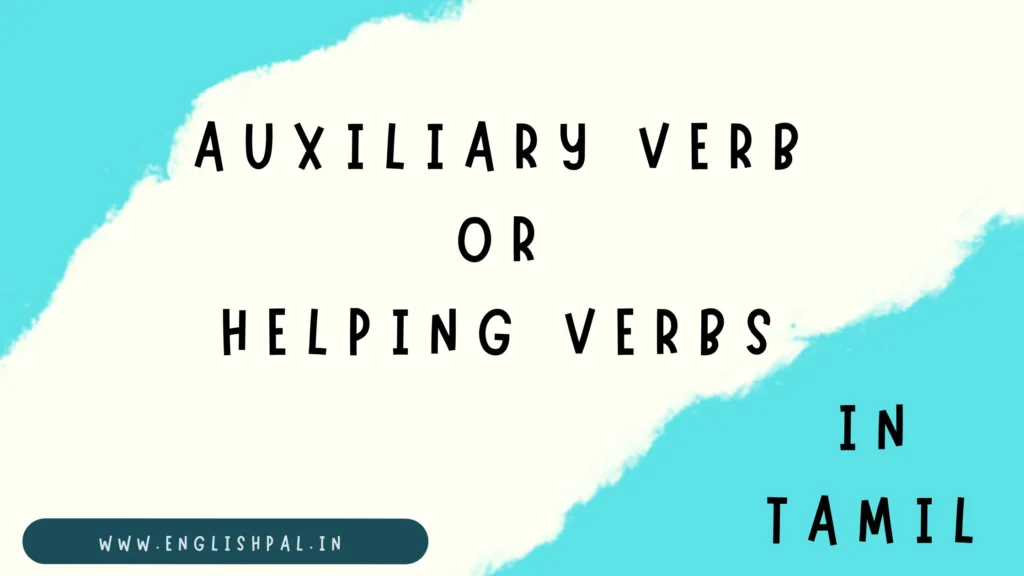
இந்த பகுதியில் அதிகம் உபயோகிக்கப்படும் Auxiliary verbs ஐ தெளிவாக எடுத்துக்காட்டுகளுடன் புரிந்துகொள்வோம்.
பொதுவாக அதிகம் உபயோகப்படுத்தும் Auxiliary verbs ஆவன,
- Have (have, has, had)
- Do (Do, Does, Did)
- Be (Be, Am, Is, Are, Was, Were, Being, Been)
Do, Does, and Did Meaning in Tamil
Do, does ஆகியவை நிகழ்காலத்தை குறிக்கும் துணை வினைச்சொற்கள் ஆகும்.
Did ஆனது இறந்த காலத்தை குறிக்கும் துணை வினைச்சொல் ஆகும்.
நாம் do வை நிகழ் கால பன்மை பெயர்ச்சொற்கள் மற்றும் நிகழ்கால பன்மை உரிபெயர்ச்சொற்களிலும் உபயோகிப்போம்.
does ஐ ஒருமை நிகழ் கால பெயர்ச்சொற்கள் மற்றும் ஒருமை நிகழ்கால உரிபெயர்ச்சொற்களிலும் உபயோகிப்போம்.
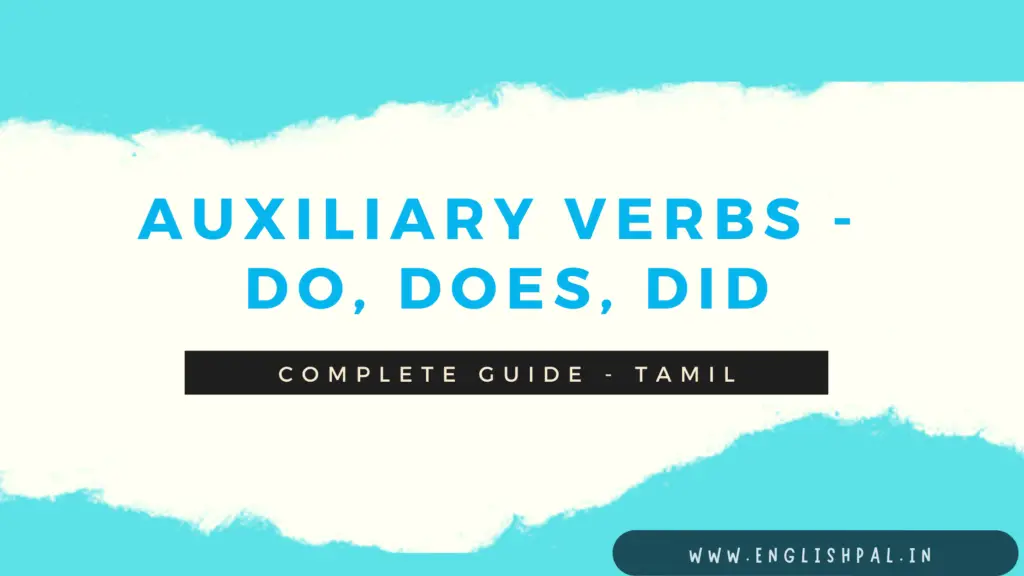
Noun, Pronoun பற்றி காண,
Pronoun (பிரதிப் பெயர்ச்சொல்) & it types in Tamil with examples
Do and Does Examples in Tamil
- I do the exercises. – நான் உடற்பயிற்சிகள் செய்கிறேன்.
- We do the exercises. – நாங்கள் உடற்பயிற்சிகள் செய்கிறோம்.
- You do a great job. – நீ வேலையை சிறப்பாக செய்கிறாய்.
- They do exercises together. – அவர்கள் ஒன்றாக உடற்பயிற்சி செய்கிறார்கள்.
- He does the job very well. – அவன் வேலையை சிறப்பாக செய்கிறான்.
- She does amazing magic tricks. – அவள் அற்புதமான மாயஜால உக்திகளை செய்கிறாள்.
- It does the worst job. – அது மோசமாக வேலை செய்கிறது.
- Mom does the cooking. – அம்மா சமையல் செய்கிறாள்.
- Dad does clean his car. – அப்பா அவருடைய காரை சுத்தம் செய்கிறார்.
Did examples in Tamil
- I did this drawing. – நான் இந்த ஓவியத்தை வரைந்தேன்.
- We did well on the exam. – நாங்கள் நன்றாக தேர்வு எழுதினோம்.
- You did the cleaning. – நீ சுத்தம் செய்தாய்.
- They did some amazing work. -அவர்கள் சில அற்புதமான வேலைகளை செய்தனர்.
- He did poorly on his exams. – அவனுடைய தேர்வுகளை மோசமாக எழுதினான்.
- She did her test very well. – அவள் அவளுடைய தேர்வை நன்றாக எழுதினாள்.
- The machine did the tasks automatically. – இயந்திரமானது தானாகவே வேலை செய்தது.
- Haran did laundry. – கரன் சலவை செய்தான்.
நிகழ்காலத்தை (present tense) பற்றி முழுமையாக அறிய இதை படிக்கவும்.
எங்கெங்கு நாம் Do, Does, and Did உபயோகிக்க வேண்டும்?
நாம் ஒரு சில இடங்களில், சூழ்நிலைகளில், மற்றும் காலங்களில் இந்த Do, Does, மற்றும் Did ஐ உபயோகிக்க முடியும். அவை என்னென்ன என இங்கு காண்போம்.
1. கேள்வி கேட்க அந்த கேள்விக்கு பதில் கூற
நாம் do, does, did ஐ பயன்படுத்தி கேள்விகளை கேட்கவும், கேள்விகளுக்கு பதில் அளிக்கவும் உபயோக்கின்றோம்.
Examples
1. Do you like tea? – உனக்கு டீ பிடிக்குமா?
No, I don’t. – இல்லை, பிடிக்காது.
Yes, I do. – ஆம், பிடிக்கும்.
2. Who did break this toy? – இந்த பொம்மையை யார் உடைத்தது?
I did. – நான் உடைத்தேன்.
She did. – அவள் உடைத்தாள்.
3 .Does she enjoy the movie? – அவள் திரைபடத்தை ரசிப்பாளா?
No, she doesn’t. – இல்லை, அவள் ரசிக்கவில்லை.
Yes, she does. – ஆம், அவள் ரசிப்பாள்.
4. Do you love her? – நீ அவளை விரும்புகிறாயா?
Yes, I do. – ஆம், விரும்புகிறேன்.
No, I don’t. – இல்லை, விரும்பவில்லை.
5. Did it rain yesterday? – நேற்று மழை பெய்ததா?
Yes, it did. – ஆம், பெய்தது.
No, it didn’t. – இல்லை, பெய்யவில்லை.
6. Do I look crazy? – நான் பைத்தியம்போல் தெரிகிறேனா?
Yes, you do. – ஆம், தெரிகிறாய்.
No, you don’t. – இல்லை, தெரியவில்லை.
7. Do you like coffee or tea? – உனக்கு காபி அல்லது டீ பிடிக்குமா?
Yes, I do like both. – எனக்கு இரண்டுமே பிடிக்கும்.
I do like coffee. – எனக்கு காப்பி பிடிக்கும்.
I do like tea. – எனக்கு டீ பிடிக்கும்.
No, I don’t like coffee and tea. – இல்லை, எனக்கு காப்பியோ, டீயோ பிடிக்காது.
2. வினைச்சொல்லை எதிர்மறையாக்க
Do not, does not, did not ஐ பயன்படுத்தி நிகழ்கால நிகழ்வுகளை எதிர்மறையாக நிகழ்வுகளாக மாற்றலாம்.
Examples
- He does not look happy. – அவன் மகிழ்ச்சியாக தெரியவில்லை.
- I do not believe you. – நான் உன்னை நம்ப மாட்டேன்.
- She did not reach the place. – அவள் அந்த இடத்தை சென்றடையவில்லை.
- We do not watch the whole movie. – நாங்கள் முழுப் படத்தையும் பார்க்கவில்லை.
- You do not need to apply it again. – நீங்கள் மீண்டும் விண்ணப்பிக்கத் தேவையில்லை.
- It does not complete its work. – அது அதனுடைய வேலையை முடிக்காது.
- They did not attend the function. – அவர்கள் விழாவுக்கு செல்லவில்லை.
- She does not attract you. – அவள் உன்னை ஈர்க்கவில்லை.
- They did not lose the match. – அவர்கள் போட்டியில் தோற்கவில்லை.
- Did you notice that? – நீ அதை கவனித்தாயா?
- No, I did not. – இல்லை, கவனிக்கவில்லை.
- Did she hear that sound? – அவள் அந்த ஒலியை கேட்டாளா?
- No, She did not. – இல்லை, கேட்கவில்லை.
- Do you recognize him?
- No, I don’t.
- அவனை உனக்கு அடையாளம் தெரிகிறதா?
- இல்லை, தெரியவில்லை.
- Did you finish your work? – நீ உனது வேலையை முடித்துவிட்டாயா?
- No, I did not. – இல்லை, முடிக்கவில்லை.
Table to remind do, does, did
| Do, Does | Singular Nouns | Plural Nouns |
| First Person | I do | We do |
| Second Person | You do | You do |
| Third Person | He does She does It does | They do They do They do |
| Did | Singular Nouns | Plural Nouns |
| First Person | I did | We did |
| Second Person | You did | You did |
| Third Person | He did She did It did | They did They did They did |
Do, does, did இன் சுருக்கம்
- Do not – Don’t
- Does not – Doesn’t
- Did not – Didn’t
Have and Has Meaning in Tamil
“have” and “has” ஆனது மக்கள் அவர்களுக்கு சொந்தமாக (மக்களினுடையது) இருப்பதை சுட்டிக் காட்ட உதவுகிறது.
மக்கள் செய்யும் அல்லது பெறும் (எ.கா., நோய்கள்) விசயங்களை குறிப்பிட இந்த “have” மற்றும் “has” உதவுகிறது.
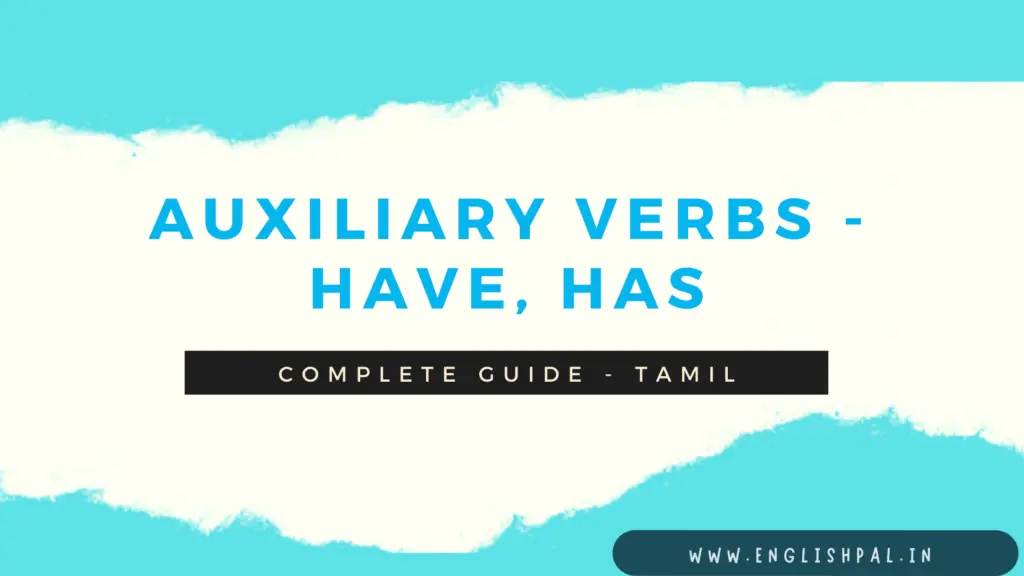
Examples
- He has a lot of money. – அவனிடம் நிறைய பணம் உள்ளது.
- She has short hair. – அவளுக்கு குட்டையான முடி.
- Mom has a cold. – அம்மாவுக்கு சளி பிடித்துள்ளது.
- I have an older brother. – எனக்கு ஒரு அண்ணா இருக்கிறார்.
- He has diarrhea. – அவனுக்கு வயிற்றுப்போக்கு உள்ளது.
- We have dinner at 10 p.m. – இரவு 10 மணிக்கு உணவு உண்கிறோம்.
எங்கெங்கு நாம் Have and has உபயோகிக்க வேண்டும்?
அனைத்து இடங்களிலும் நம்மால் இந்த have மற்றும் has ஐ உபயோகிக்க முடியாது. அவற்றை எங்கெங்கு குறிப்பிடவேண்டும் என இப்போது காண்போம்.
Third person singular pronoun தவிர மற்ற pronouns
- Plural nouns மற்றும் first and second person pronoun, third person plural pronoun வரும் இடங்களில் நாம் have உபயோக்கிக்க வேண்டும்.
- I, we, you, they, Plural nouns + have
Third person singular pronouns க்கு மட்டும்
- plural nouns மற்றும்third person singular pronoun வரும் இடங்களில் நாம் has உபயோக்கிக்க வேண்டும்.
- he, she, it, any name, singular nouns + has
Examples – have and has
- I have brand new shoes. – என்னிடம் புத்தம்புதிய காலணிகள் உள்ளன.
- We have a new mathematics teacher. – எங்களிடம் புதிய கணித ஆசிரியர் இருக்கிறார்.
- You have long and beautiful hair. – உனக்கு நீண்ட மற்றும் அழகான முடி உள்ளது.
- They have a fever. – அவர்களுக்கு காய்ச்சல் இருக்கிறது.
- He has a pet dog. – அவனுக்கு செல்ல நாய் ஒன்று உள்ளது.
- She always has biryani for lunch. – மதிய உணவுக்கு அவள் எப்போதும் பிரியாணி தான்.
- It has a huge head. – அதற்கு மிகப்பெரிய தலை உள்ளது.
- Haran has a headache. – கரனுக்குத் தலைவலி.
Have and has – Table to remember
| Have and Has | Singular Nouns | Plural Nouns |
| First Person | I have | We have |
| Second Person | You have | You have |
| Third Person | He has She has It has | They have They have They have |
Have and has சுருக்கம்
| I have | I’ve |
| We have | We’ve |
| You have | You’ve |
| They have | They’ve |
| He has | He’s |
| She has | She’s |
| It has | It’s |
| Have not | Haven’t |
| Has not | Hasn’t |
Am, Is, and Are in Meaning Tamil
Am, Is, and Are ஆகியவை உதவி வினைச்சொற்கள் ஆகும். பொதுவாக இவற்றை நாம் pronouns உடன் சேர்த்து உபயோகிப்போம்.
| Am, Is, Are – be form verbs | Pronouns |
| Am | I |
| Is | he, she, it, name |
| Are | we, you, they |
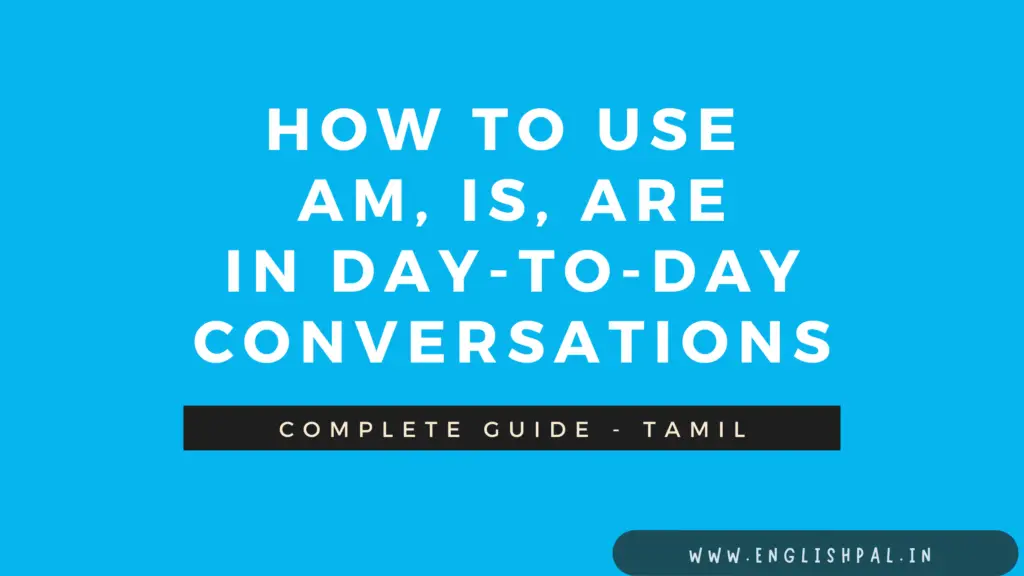
Examples of Am, Is, and are
- I am Haran. – நான் கரன்.
- I am not guna. – நான் குணா இல்லை.
- We are friends. – நாங்கள் நண்பர்கள்.
- We are not enemies. – நாங்கள் எதிரிகள் இல்லை.
- You are the best. – நீ சிறந்தவன்.
- They are good workers. – அவர்கள் நல்ல உழைப்பாளிகள்.
- They are not lazy. – அவர்கள் சோம்பேறி அல்ல.
- He is more dangerous. – அவன் மிகவும் ஆபத்தானவன்.
- She is my mother. – அவள் எனது அம்மா.
- She is not a doctor. – அவள் மருத்துவர் அல்ல.
- Haran is a professor. – கரன் ஒரு பேராசிரியர்.
- It is a dog. – இது ஒரு நாய்.
- It is not a cat. – இது பூனை அல்ல.
- It is very cold today. – இன்று மிகவும் குளிர்ரக உள்ளது.
- It is not very comfortable. – இன்று மிகவும் வசதியாக இல்லை.
First person
| First person singular | I am |
| First person plural | We are |
Second person
| Second person singular | you are |
| Second person plural | you are |
Third person
| Third person singular | he is, She is, It is, |
| Third person plural | They are |
Am, Is, and Are இன் சுருக்கம்
- I am – I’m
- We are – We’re
- You are – you’re
- They are – they’re
- He is – he’s
- She is – she’s
- It is – it’s
- Am not – ain’t
- Am not – aren’t (use it only for asking questions).
- Is not – isn’t
- Are not – aren’t
எங்கெங்கு நாம் am, is, are உபயோகிக்க வேண்டும்?
1. பொதுவாக am, is ஐ ஒருமை பெயர்சொல்லுடனும்(singular noun), are ஐ பன்மை பெயர்சொல்லுடனும்(plural noun) உபயோகிக்க வேண்டும்.
Example
- Haran is a doctor. – கரன் ஒரு மருத்துவர்.
- We are so proud of you. – உன்னை நினைத்து நாங்கள் பெருமை கொள்கிறோம்.
- A peacock is a kind of bird. – மயில் ஒரு வகை பறவை.
- The dog is a domestic animal. – நாய் ஒரு வீட்டு விலங்கு.
- The balloons are very small. -பலூன்கள் சிறியதாக உள்ளன.
- It is so beautiful. – இது மிகவும் அழகாக உள்ளது.
2. நம்மால் பார்க்க மற்றும் கேட்கக் கூடிய செயல்களை குறிப்பிட “is” மற்றும் “are” உபயோகிக்கலாம்.
- There are some oak trees on the hill. – மலையில் ஓக் மரங்கள் உள்ளன.
- There are a lot of mangoes on the mango tree. – மாமரத்தில் நிறைய மாம்பழங்கள் இருக்கின்றன.
- Are there any vessels to wash? – கழுவுவதற்கு வேறு பாத்திரங்கள் இருகின்றனவா?
- There are a few snakes on the farm. – சில பாம்புகள் விளைநிலத்தில் உள்ளன.
More examples of Am, Is, and are
- His cat is very friendly. – அவனது பூனை மிகவும் நட்பானது.
- He is a doctor. – அவன் ஒரு மருத்துவன்.
- You are shorter than me. – நீ என்னை விட உயரம் குறைவானவன்.
- I am happy for you. – உங்களுக்காக நான் மகிழ்ச்சி அடைகிறேன்.
- It is a rainy day. – இது ஒரு மழை நாள்.
Was, Were in Meaning Tamil
was and were இறந்த காலத்தை பற்றி குறிப்பிட உதவுகிறது. இவை be form verb என்றும் அழைக்கப்படுகிறது.
- was – Past tense of Am, Is.
- Were – Past tense of are.
- Was இருந்தது.
- were இருந்தன.
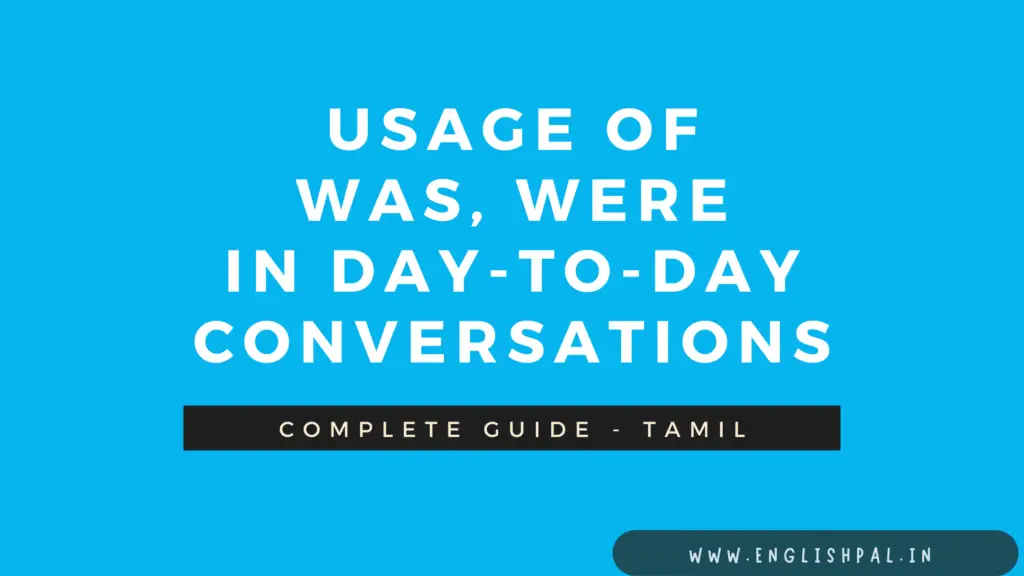
எங்கெங்கு நாம் was, were உபயோகிக்க வேண்டும்?
நாம் was மற்றும் were ஐ இறந்த காலத்தில் உபயோகிக்கும் என்று பார்த்தோம் அல்லவா? அது போல் இதனை உபயோகப்படுத்த எந்த வகை பெயர்ச்சொல் மற்றும் உரிச்சொற்களுக்கு எதை உபயோகிக்க வேண்டும் என உள்ளது. அவற்றை பற்றி இப்போது காணலாம்.
Was (இருந்தது)
Am, is இன் இறந்த கால வினைச்சொல்லே Was ஆகும். நாம் இதை ஒருமை பெயர்ச்சொற்கள், மற்றும் ஒருமை உரிசொற்களில் உபயோகிப்போம்
I / he / she / it / singular nouns + was
Examples of Was
- I was 10 years old when you left us. – நீங்கள் என்னை விட்டு சென்ற போது எனக்கு பத்து வயது இருக்கும்.
- He was not well last week. – கடந்த வாரம் அவனுக்கு உடல்நிலை சரி இல்லை.
- She was hungry last night. – நேற்று இரவு அவள் பசியில் இருந்தாள்.
- It was a great experience to meet you. – உங்களை சந்தித்தது மிகப்பெரிய அனுபவமாக இருந்தது.
- Haran was a great football player during his school days. – கரன் அவனுடைய பள்ளி நாட்களில் சிறந்த கால்பந்து வீரனாக இருந்தான்.
Were (இருந்தன)
Are இன் இறந்த கால வினைச்சொல்லே Were ஆகும். நாம் இதை பன்மை பெயர்ச்சொற்கள், மற்றும் பன்மை உரிசொற்களில் உபயோகிப்போம்
You / they / we / plural nouns + were
Examples of Were
- Were you in the hall when I called you? – நான் உன்னை அழைத்தபோது நீ ஹாலில் இருந்தாயா?
- We were in the same school. 0 நாங்கள் ஒரே பள்ளியில் படித்தோம்.
- They were first in the cycle race. – அவர்கள் சைக்கிள் பந்தயத்தில் முதலிடம் பிடித்தனர்.
- Those were my best shoes. – அவை என்னுடைய நல்ல காலனிகளாக இருந்தன.
- You were 13 years old when we last met. – நாம் கடைசியாக சந்தித்த போது உனக்கு 13 வயது.
இறந்த காலத்தை (past tense) பற்றி காண.
First Person(தன்மை)
| First person singular | I was |
| First person plural | We were |
Second Person(முன்னிலை)
| Second person singular | you were |
| Second person plural | you were |
Third Person(படர்க்கை)
| Third person singular | he was, She was, It was, |
| Third person plural | They were |
Was, were சுருக்கம்
- Were not – weren’t
- Was not – wasn’t
Modal Auxiliary verb பற்றி தெரிந்து கொள்ள
Conclusion
நாம் இங்கு துணை வினைச்சொற்கள் என்றால் என்ன, அவற்றின் வகைகள், எப்பொழுது எந்த சமயங்களில் நாம் அதனை உபயோகிக்க வேண்டும் என்பதை ஒவ்வொன்றிற்கும் எடுத்துக்காட்டுகளுடன் தெளிவாக பார்த்தோம். இது உங்களுக்கு துணை வினைச்சொற்கள் பற்றி பல புது விஷயங்களை கற்று இருப்பீர்கள் என நபுகிறேன்.
இந்த பதிவினைப் பற்றிய உங்கள் கருத்துக்கள் வரவேற்கப்படுகின்றன. ஏதேனும் சந்தேகங்கள் இருப்பின் அதை comment இல் தெரிவியுங்கள்.
நன்றி! வாழ்த்துக்களும் அன்புகளும்!

